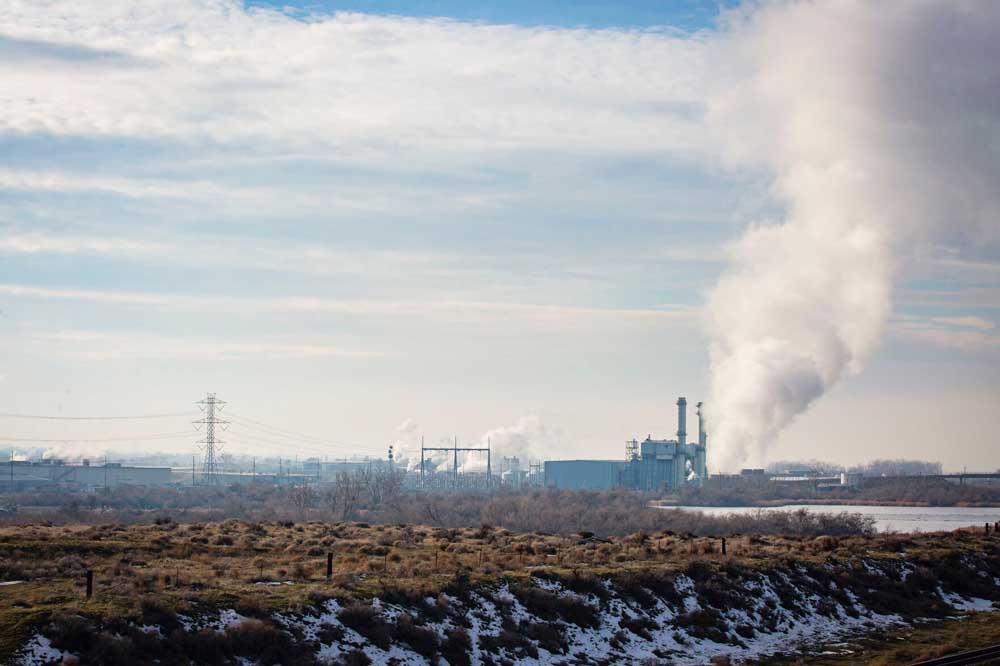Oregon DEQ again fines troubled Eastern Oregon port
Published 5:00 am Sunday, April 7, 2024

- Industrial facilities operate Jan. 11, 2022, at the Port of Morrow near Boardman. The Oregon Department of Environmental Quality on April 4, 2024, fined the port another $727,050 for ongoing violations of its wastewater permit.
BOARDMAN — The Oregon Department of Environmental Quality has hit the Port of Morrow with another fine.
The DEQ on April 4 issued the port a notice for a fine of $727,050 for almost 900 wastewater permit violations during the nongrowing season from November to February.
Antony Vorobyov, public affairs specialist for DEQ’s Eastern Region, explained the violations occurred because the port does not have the necessary wastewater treatment and storage systems to operate in compliance with its permit.
Port of Morrow Executive Director Lisa Mittelsdorf said the port knew this was coming as part of the 2023 settlement the port made with the DEQ. Under that deal, the state regulatory agency will continue to penalize the port until it comes into compliance.
“The Port of Morrow is investing $500 million to upgrade its wastewater treatment system to meet DEQ regulatory requirements,” Mittelsdorf said in a prepared statement. “When upgrades are in place, the port will have storage capacity to avoid winter-season land application.”
Vorobyov said the port is in the process of constructing these systems and is on track to come into compliance by November 2025.
In addition to the violations that occurred during the nongrowing season between Nov. 1, 2023, and Feb. 29, the DEQ included fines for several spills the port had outside the nongrowing period in March.
“So these penalties, they deter future violations and incentivize the port to minimize impact to groundwater while it constructs the necessary treatment storage systems,” Vorobyov said.
Until then, the DEQ is continuing to issue penalties when violations occur to hold the port accountable.
The October 2023 settlement the port agreed to with the DEQ incentivized the port to protect groundwater, Vorobyov said, and the process is working — the port in the last couple of years has improved practices to reduce risk to groundwater, particularly near drinking water wells.
“More specifically, the port did not apply wastewater to any high risk fields,” he said. “These are fields near drinking water supplies and in soils most susceptible to leaching losses to groundwater during this most recent winter season,” which is Nov. 1 through Feb. 29.
“Since the port did not apply wastewater to high-risk fields in the past winter, this past nongrowing season, none of the most recent violations occurred on high-risk fields,” he said.
Rather, 3% of the port’s application in excess of permit limits from November 2023 through February occurred at medium-risk fields, and 97% were on low-risk fields.
Vorobyov also said the DEQ encourages the port to dedicate 80% of this penalty to continue funding the Oregon Health Authority’s local drinking water delivery and its well-testing program.
DEQ’s Supplemental Environmental Project policy allows up to 80% of fines to go to projects that benefit human health and the environment. The DEQ as part of the 2023 settlement approved a project for the port to pay almost $2 million for the next two years to fund OHA’s safe water services to households in the Lower Umatilla Basin Groundwater Management Area that rely on domestic wells for their drinking water.
Mittelsdorf in her statement said the port will designate 80% of this new fine toward a project to support a safe water drinking program. The remaining 20% goes into the state’s general fund.
Locals can voice their concerns
Residents living in the Lower Umatilla Basin Groundwater Management Area have an opportunity to tell key state agencies how nitrate in groundwater affects their lives.
The Oregon Department of Environmental Quality, Department of Agriculture, Water Resources Department and Oregon Health Authority are holding a public meeting 6-8 p.m. April 18 in the Riverside High School auditorium on the contaminated groundwater situation in the LUBGWMA.
According to the meeting notice, DEQ Director Leah Feldon, ODA Director Lisa Charpilloz Hanson and OWRD Acting Director Doug Woodcock join agency experts in a facilitated Q&A session about nitrate groundwater contamination in the LUBGWMA.
The meeting will focus on environmental issues, but OHA will be available to answer questions about public health services available to LUBGWMA residents at risk from high nitrate levels in domestic well water.
Agencies also will host an open house-style tabling session to speak to community members one-on-one. Community members also will have access to information about free domestic well water testing.
For more information about the meeting, including how to participate via Zoom, visit shorturl.at/ixLR0.






